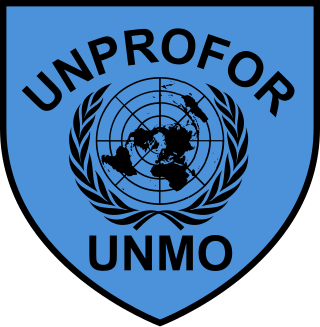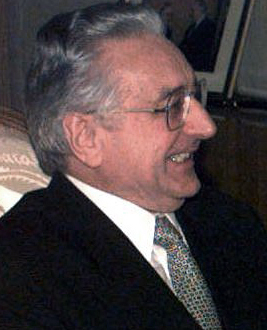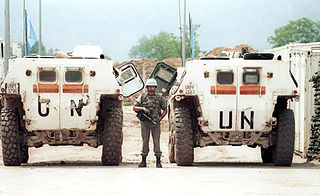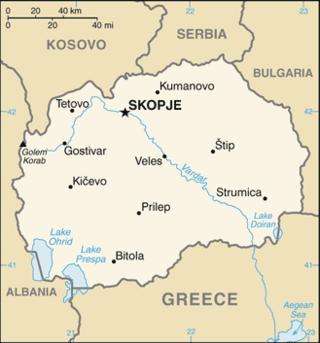
The United Nations Protection Force was the first United Nations peacekeeping force in Croatia and in Bosnia and Herzegovina during the Yugoslav Wars. The force was formed in February 1992 and its mandate ended in March 1995, with the peacekeeping mission restructuring into three other forces.

The United Nations Confidence Restoration Operation in Croatia, commonly abbreviated UNCRO, was a United Nations (UN) peacekeeping mission in Croatia. It was established under Chapter VII of the United Nations Charter and approved by the UN Security Council (UNSC) Resolution 981 on 31 March 1995. UNCRO inherited personnel and infrastructure from the United Nations Protection Force (UNPROFOR). Its command was located in Zagreb; the peacekeeping troops were deployed in four sectors named North, South, East, and West. Twenty different countries contributed troops to the mission.
The United Nations Preventive Deployment Force (UNPREDEP) was established on 31 March 1995 in Security Council Resolution 983 to replace the United Nations Protection Force (UNPROFOR) in the Republic of Macedonia. The mandate of UNPREDEP remained essentially the same: to monitor and report any developments in the border areas which could undermine confidence and stability in the country and threaten its territory. It is widely considered to be an instance of a successful deployment of UN peacekeeping forces in the prevention of conflict and violence against civilians. The operation was shut down on 28 February 1999, after its last extension in Resolution 1186 when China vetoed its renewal in 1999 following Macedonia's diplomatic recognition of Taiwan. This mission was unique as it was the first peacekeeping operation to undertake conflict prevention before the outbreak of conflict. The premature termination of UNPREDEP in 1999 predates the 2001 insurgency in Macedonia.
The United Nations Peacekeeping efforts began in 1948. Its first activity was in the Middle East to observe and maintain the ceasefire during the 1948 Arab–Israeli War. Since then, United Nations peacekeepers have taken part in a total of 72 missions around the globe, 12 of which continue today. The peacekeeping force as a whole received the Nobel Peace Prize in 1988.

United Nations Security Council resolution 740, adopted unanimously on 7 February 1992, after reaffirming resolutions 713 (1991), 721 (1991), 724 (1991) and 727 (1992) and considering a report by the Secretary-General Boutros Boutros-Ghali, the Council approved plans for a peacekeeping mission in the Socialist Federal Republic of Yugoslavia.

United Nations Security Council resolution 743, adopted unanimously on 21 February 1992, after reaffirming resolutions 713 (1991), 721 (1991), 724 (1991), 727 (1992) and 740 (1992), and considering that the situation in the Socialist Federal Republic of Yugoslavia constituted a threat to international peace and stability, the council established a peacekeeping mission in the country, known as the United Nations Protection Force (UNPROFOR), with the aim of reaching a peaceful political settlement in the region.

United Nations Security Council resolution 795, adopted on 11 December 1992, after expressing concern about possible developments which could undermine confidence and stability in the Republic of Macedonia and welcoming the Organization for Security and Co-operation in Europe (OSCE) mission in Macedonia, the Council recalled Chapter VIII of the United Nations Charter and authorised the Secretary-General Boutros Boutros-Ghali to deploy a presence of the United Nations Protection Force (UNPROFOR) in the border areas of Macedonia.

United Nations Security Council resolution 847, adopted unanimously on 30 June 1993, after reaffirming Resolution 743 (1992) and subsequent resolutions relating to the United Nations Protection Force (UNPROFOR), the council condemned military attacks in Croatia and Bosnia and Herzegovina and extended the mandate of UNPROFOR until 30 September 1993.

United Nations Security Council resolution 850, adopted unanimously on 9 July 1993, after reaffirming resolutions 782 (1992), 797 (1992) and 818 (1993) on the situation in Mozambique, the Council discussed the implementation of the Rome General Peace Accords and the formation of a new armed forces in the country.

United Nations Security Council resolution 981, adopted unanimously on 31 March 1995, after reaffirming all resolutions on the situation in the former Yugoslavia, the council established the United Nations Confidence Restoration Operation in Croatia (UNCRO) for a period terminating 30 November 1995.
United Nations Security Council resolution 983, adopted unanimously on 31 March 1995, after recalling Resolution 795 (1992) on Macedonia, the Council expressed concern about threats to the stability of the country and established the United Nations Preventive Deployment Force (UNPREDEP) by renaming the United Nations Protection Force (UNPROFOR) unit in the country for a period ending 30 November 1995.

United Nations Security Council resolution 1027 was adopted unanimously on 30 November 1995. This occurred after recalling previous resolutions including Resolution 983 (1995) on Macedonia. The Council extended the mandate of the United Nations Preventive Deployment Force (UNPREDEP) until 30 May 1996.

United Nations Security Council resolution 1058, adopted on 30 May 1996, after recalling previous resolutions including resolutions 1027 (1995) and 1046 (1996), the Council extended the mandate of the United Nations Preventive Deployment Force (UNPREDEP) in Macedonia until 30 November 1996.

United Nations Security Council resolution 1082, adopted unanimously on 27 November 1996, after recalling previous resolutions including 1046 (1996) and 1058 (1996), the Council extended the mandate of the United Nations Preventive Deployment Force (UNPREDEP) in Macedonia until 31 May 1997 and reduced its size.
United Nations Security Council resolution 1105, adopted unanimously on 9 April 1997, after recalling Resolution 1082 (1996), the Council decided to suspend reduction of the military component of the United Nations Preventive Deployment Force (UNPREDEP) in Macedonia until the end of its current mandate, until 31 May 1997.

United Nations Security Council resolution 1110, adopted unanimously on 28 May 1997, after recalling resolutions 1082 (1996) and 1105 (1997), the Council renewed the mandate of the United Nations Preventive Deployment Force (UNPREDEP) in Macedonia until 30 November 1997.

United Nations Security Council resolution 1142, adopted unanimously on 4 December 1997, after recalling resolutions 1105 (1997) and 1110 (1997), the Council extended the mandate of the United Nations Preventive Deployment Force (UNPREDEP) in Macedonia until 31 August 1998.

United Nations Security Council resolution 1186, adopted unanimously on 21 July 1998, after recalling resolutions 1105 (1997) and 1110 (1997), the Council extended and strengthened the mandate of the United Nations Preventive Deployment Force (UNPREDEP) in Macedonia until 28 February 1999.

Democratic Federal Yugoslavia was a charter member of the United Nations from its establishment in 1945 as the Socialist Federal Republic of Yugoslavia until 1992 during the Yugoslav Wars. During its existence the country played a prominent role in the promotion of multilateralism and narrowing of the Cold War divisions in which various UN bodies were perceived as important vehicles. Yugoslavia was elected a non-permanent member of the United Nations Security Council on multiple occasions in periods between 1950 and 1951, 1956, 1972–1973, and 1988–1989, which was in total 7 years of Yugoslav membership in the organization. The country was also one of 17 original members of the Special Committee on Decolonization.

United Nations Security Council Resolution S/1999/201 was proposed on February 25, 1999, on whether to send a reserve intervention force to Macedonia. China used its veto to boycott in retaliation for Macedonia's establishment of diplomatic relations with Taiwan, and the case failed.















